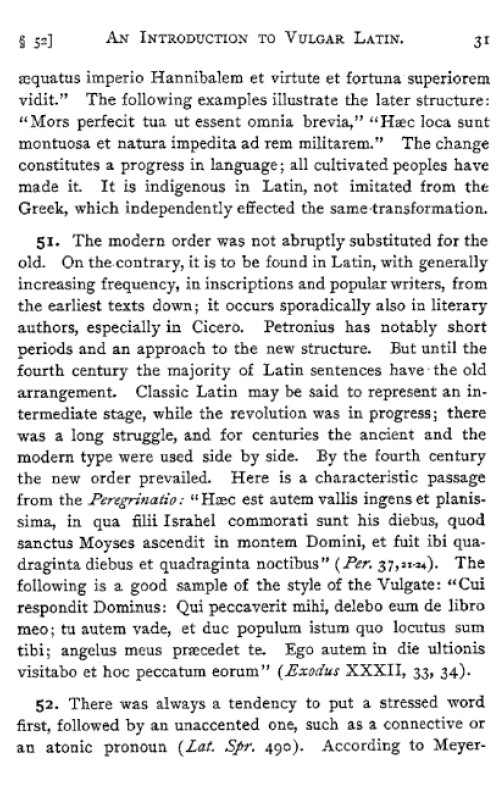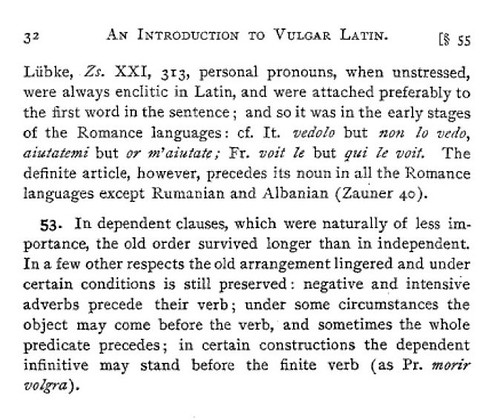Zénbat eta postpositiboki sintetikoagoa izán elementu sintaktiko bat, hainbat zailagoa bere dislokazio prepositiboa, logikoki
Una frase como speluncam in currunt significaba “corren adentro, a la cueva”, con el tiempo, sin embargo, se produjo una dislocación relacionándose el adverbio in ya con el verbo, con lo cual surgió el compuesto incurro, ya con el sustantivo del cual se convirtió en un determinante, asumiendo, pues, el papel de posposición (speluncam in) o, y es el caso más frecuente en latín, de preposición (in speluncam). Así, pues, una misma partícula podía usarse como adverbio, preverbio y preposición [M. Bassols de Climent, "Sintaxis Latina", 1992:144-145]Gauza da ze adverbioak, hitz aski independenteak izanik, aski aise mugitu edo dislokatu ahal dira ki posizio ezohikoak afin bukátu bilakatzen adibidez preposizio. Antzera ere, beste maila batean, konplementu direktoak hasi ahal dira dislokatzen ki posizio postverbalak eta bukatu sortzen VO ordenamendu sintaktikoa:
Beraz, modu ezberdinetako dislokazioak ager daitezke an hasierá on evoluzio sintaktiko ezberdinak, denak ere oso interesgarriak. Baina, gauza da ze lehenengo urrats hori (dislokazioa) ez da izanen erraza noiz behar den dislokatu elementu bat zein dagoen, nolabait esan, fusionatua ki beste zerbait, nola gertatzen den kin atzizki deklinatiboak (zenbat eta fusionatuago, zailagoa dislokazioa).
Latinean, adibidez, bádira arrastoak on inesibo postpositibo indoeuroparra ("-ai") zein existitu baitzen lehenago ze orokortu zedin "in" preposizio inesiboa:
La partícula “...-ae” del genitivo latino originalmente fue “...-ai”, es decir el antiguo locativo. “Rey de Roma” expresado por “Rex romae”, significa en realidad “Rey en Roma”. [Azkue, R.M., Diccionario Vasco-Español-Francés]Izan ere, aurreneko latinean aurkitu ahal da "-ae" atzizki lokatiboa, nahiz izan fosildua an osagarri oso motz eta errepikatuak nola "Romae".
Azpimarratu nahi dugu ze latinaren preposizio inesibo berria ez zen etorriko ti dislokazioa on "-ai" atzizki inesiboa. Ez. Hizkuntza indoeuroparrak horretarako egokituko zuén beste material bat, beste partikula bat independenteagoa, hain justu "in" adverbioa (gogoratu atzoko sarrera), bitartean-ze "-ae" lokatibo zaharrak mantenduko zen an erabilera fosilduak harik-eta, finean, deságertu.
Izan ere, zenbat eta postpositiboki sintetikoagoa izán elementu sintaktiko bat, hainbat zailagoa bere dislokazio prepositiboa, logikoki. [365] [>>>]
Etiketak: dislokazioa, garabideak, latina




